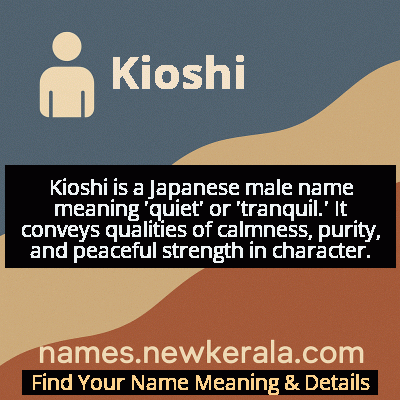Kioshi Name Meaning & Details
Origin, Popularity, Numerology Analysis & Name Meaning of Kioshi
Discover the origin, meaning, and cultural significance of the name KIOSHI. Delve into its historical roots and explore the lasting impact it has had on communities and traditions.
Name
Kioshi
Gender
Male
Origin
Japanese
Lucky Number
8
Meaning of the Name - Kioshi
Kioshi is a Japanese male name meaning 'quiet' or 'tranquil.' It conveys qualities of calmness, purity, and peaceful strength in character.
Kioshi - Complete Numerology Analysis
Your Numerology Number
Based on Pythagorean Numerology System
Ruling Planet
Saturn
Positive Nature
Ambitious, efficient, realistic, and authoritative.
Negative Traits
Materialistic, stressed, confrontational, and can be overly ambitious.
Lucky Colours
Dark blue, black.
Lucky Days
Saturday.
Lucky Stones
Blue sapphire, amethyst.
Harmony Numbers
2, 4, 6.
Best Suited Professions
Business leaders, managers, financial services, law enforcement.
What People Like About You
Leadership, determination, organizational skills.
Famous People Named Kioshi
Kiyoshi Kiyosawa
Journalist and Historian
Renowned for critical analysis of Japanese foreign policy during World War II
Kiyoshi Itō
Mathematician
Pioneer of stochastic calculus and creator of Itō calculus
Kiyoshi Hikawa
Enka Singer
Multiple Japan Record Award winner known as the 'Prince of Enka'
Kiyoshi Tamura
Professional Wrestler
Legendary fighter and founder of RINGS promotion
Name Variations & International Equivalents
Click on blue names to explore their detailed meanings. Gray names with will be available soon.
Cultural & Historical Significance
In modern Japanese culture, Kiyoshi continues to represent traditional virtues while adapting to contemporary contexts. The name embodies the Japanese concept of 'wa' (harmony) and the cultural appreciation for quiet strength over overt aggression. It reflects the aesthetic principle of 'wabi-sabi' - finding beauty in simplicity and imperfection - and the philosophical ideal of the strong, silent type who leads through wisdom rather than force. This name has maintained its cultural relevance by balancing traditional values with modern interpretations of masculinity and leadership.
Extended Personality Analysis
Individuals named Kiyoshi are typically associated with calm, thoughtful, and introspective personalities. They often exhibit a natural inclination toward observation and analysis, preferring to listen carefully before speaking. This quiet demeanor is not indicative of weakness but rather reflects deep inner strength and emotional stability. Kiyoshis are known for their reliability and consistency, making them trusted friends and colleagues who provide steady support during turbulent times.
Their analytical nature often leads them toward intellectual pursuits, with many excelling in fields requiring careful thought and precision. While they may appear reserved in social situations, they form deep, meaningful relationships with those they trust. Kiyoshis typically demonstrate exceptional patience and perseverance, approaching challenges with methodical determination rather than impulsive action. Their quiet confidence often makes them natural leaders who inspire through example rather than rhetoric, embodying the Japanese proverb 'The still waters run deep' in their approach to life and relationships.
Modern Usage & Popularity
In contemporary Japan, Kiyoshi maintains steady but moderate popularity, often chosen by parents who value traditional virtues and cultural heritage. While not among the top-ranking names in recent years, it enjoys consistent usage across generations, particularly in families with strong connections to Japanese cultural traditions. The name has seen some resurgence among parents seeking meaningful names that contrast with more modern, flashy naming trends. Internationally, Kiyoshi has gained some recognition through Japanese cultural exports, though it remains relatively uncommon outside Japanese communities. Its usage patterns reflect a balance between maintaining cultural identity and adapting to global naming trends, with many parents appreciating its timeless quality and deep cultural resonance.
Symbolic & Spiritual Meanings
Symbolically, Kiyoshi represents the power of quiet strength and inner clarity. It embodies the metaphorical concept of 'still waters' - the idea that profound depth and strength often lie beneath a calm surface. The name symbolizes purity of intention and clarity of purpose, reflecting the Japanese aesthetic of 'shibumi' - elegant simplicity and understated beauty. In broader symbolic terms, Kiyoshi represents the balance between action and contemplation, suggesting that true wisdom comes from thoughtful observation rather than constant activity. It carries connotations of resilience and endurance, much like bamboo that bends but doesn't break in the storm, symbolizing the ability to withstand life's challenges through inner fortitude rather than external show of force.

